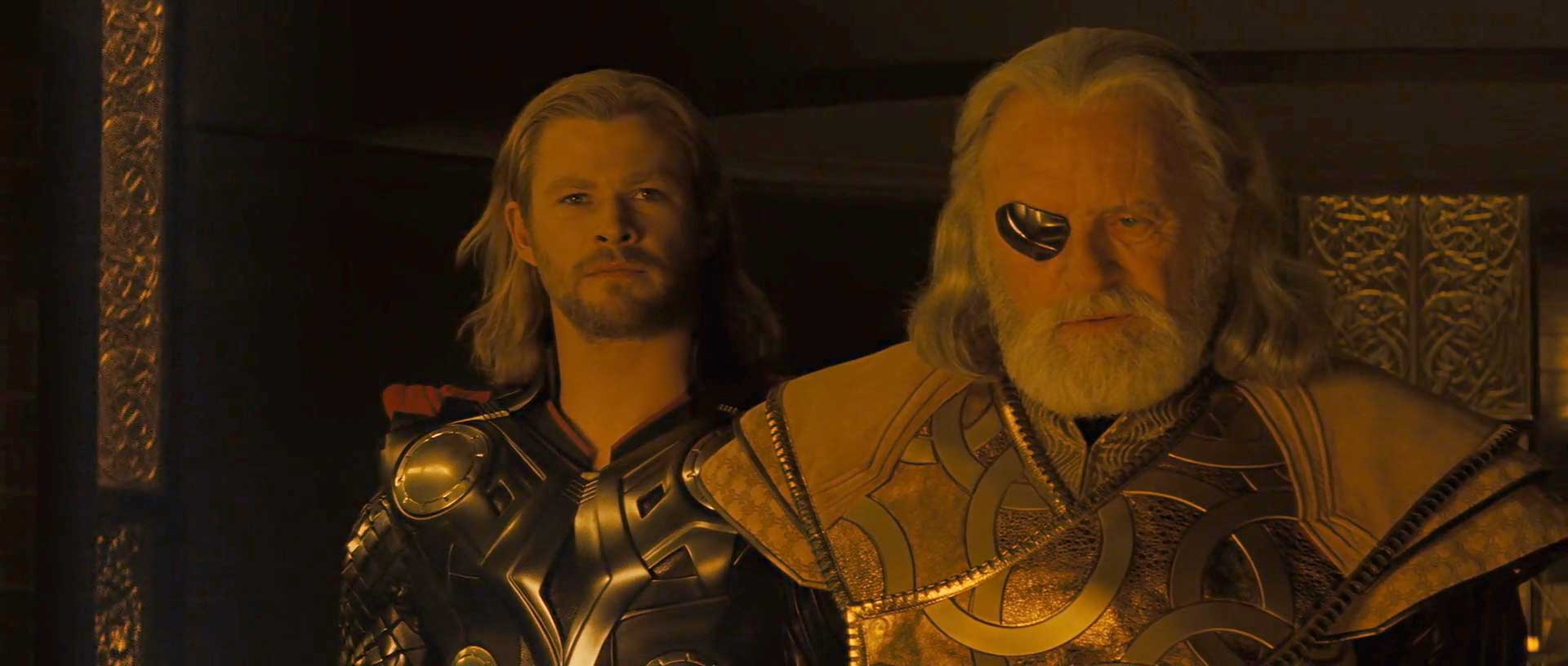Over the years, Marvel Studios has cultivated a reputation for taking some balanced, calculated risks. I use that language because its movies have also been criticized for adhering to an intangible formula, a ghost template that operates in the background and one which all of its films somehow abide by even though it’s difficult to pinpoint what that is exactly. And yet, when the studio found itself out of characters with two Iron Man movies under its belt already, it was left with no option but to dig deeper into its comic archives for characters it could adapt for the big screen.
And out of the depths of the dungeons, was born The Mighty Thor, a character that’s at once unusual to adapt as he is a safe play. Upon first recital, Thor invokes the likes of He-Man, Hercules and other machoistic men who would’ve proven to be an easy sell once upon a time. The landscape though had changed significantly and after Spider-Man, The Dark Knight or even Iron Man if you will, people were on the lookout for heroes that can be grounded in some semblance of reality. To introduce a God as a superhero at this time when virtually nothing about him would strike a chord with the common audience was a risky move. To commit a humungous $150 million production budget to realize this God’s vision and the world he inhabited was riskier still, especially for a studio that was just three films old.
Fortunately, as I opened this piece with, Marvel had a knack for taking calculated risks (a topic we’ll keep revisiting throughout this series). To offset some of the project’s uncertain elements, they hired Kenneth Branagh to direct. With a background in Shakespeare (having filmed an $18 million production of Hamlet on 70 mm), Branagh was the right choice to helm the Asgardian portions of Thor. He lent to those sequences, an other-worldly demeanor, as if you were watching tales of the old Norse gods. But he alone would be limited, were it not for the amazing cast they rounded off for Thor. With heavyweights like Natalie Portman and Anthony Hopkins signing on to play Jane Foster and Odin respectively, along with Colm Feore and Stellan Skarsgaard as Laufey and Erik Selvig, the big names helped offset the relatively smaller leads played by Tom Hiddleston (Loki) and Chris Hemsworth (Thor). The result was an ensemble that were glad to be on board for a myriad of reasons, chief among them being Branagh’s presence as director.
The challenge then, apart from realizing the lush visuals at that scale on a limited cost, was to create an arc for Thor and the others that would strike some ground with audiences. Accordingly, Branagh and the writers focused on the father-son dynamics between Thor and Odin. As much as it may be derided for its earth sequences, Thor really has some of the more fulfilling and fleshed out arcs in an MCU movie that truly take its leads on a trajectory of strong self realization. Thor himself goes from being an arrogant, hot-headed, brawly, irresponsible and immature God who fails to realize the value of his lineage and power to someone who learns the concepts of gratitude, kindness, humility, responsibility and leadership. At the other end, Loki goes from a smart, sharp, calculated schemer to an outright envious, angry, dejected son and brother with evil, sinister motivations. Odin has a tinge of pride in his eye when he realizes the growth that Thor has gone through, even has he regrets losing his other foster son to the cosmos.

At first glance, Thor may just seem like the routine superhero movie without anything of significance to offer to the larger Marvel Cinematic Universe. But despite its fair share of pitfalls (a routine plot ironically being one of them) it does bring a few contributions of its own. For one, it’s the first full-fledged Marvel Studios movie to be done without Iron Man, standing completely on its own without an appearance from Tony Stark. Two, it introduces to the MCU the concept of beings other than humans and worlds and realms other than earth. Asgard and Jotunheim are but two of the nine realms glimpsed at in Thor that help sell the idea that this shared universe is more than the stories told on earth, and covers areas beyond the widest expanses of the cosmos. It’s also important for selling viewers the idea that Marvel is truly committed to its vision of bringing the inevitable crossover of these heroes to the big screen, and isn’t going to back down or let middling reception alter its plans. And lastly, something I already covered earlier, is that Thor is proof that Marvel Studios is not going to cut costs to make even their most offbeat of movies, pledging $150 million for the obscurest of obscure properties, even though internally it may be firing and replacing actors over cost issues.
The simplicity of Thor‘s tale is also where its beauty lies. It introduces a plethora of new concepts by weaving them together in a fairy tale so simple and accessible than even the most unassuming of viewers would be able to grasp, follow and relish the exploits of Thor and his fellow Asgardians. The nine realms, Asgard, Jotunheim, Frost Giants, Gods, Mjolnir, Casket of Ancient Winters, Odinsleep, Bifrost, Heimdall … that’s a lot of stuff to tackle in a movie that already has a significant portion set on earth, one that includes its own S.H.I.E.L.D. subplot featuring Coulson and, in his first MCU appearance, Jeremy Renner’s Clint Barton a.k.a. Hawkeye. And yet Kenneth Branagh and writers Ashley Edward Miller and Zack Stentz (with some rewrite work by Don Payne) wrap all of this neatly in a tale that can very well be understood by kids. It helps that Thor is edited tightly by Paul Rubell, keeping it under the 2 hour mark (thereby increasing possible showings) but it’s also disappointing when you examine all the deleted scenes that get left out as a consequence, most of which could’ve been kept to plug in certain inexplicable plot holes (such as how Loki became king).
And while it’s not related to the movie in any way, Thor did bring about a first for Marvel Studios through its Blu-Ray release by introducing the concept of Marvel One-Shots. These short, mostly self-contained films are meant to expand the MCU beyond what happens in the movies by showing how some supporting characters work behind the scenes. In the case of The Consultant, the One-Shot included with Thor, S.H.I.E.L.D. agents Phil Coulson and Jasper Sitwell brainstorm ideas about getting an aggravated and insistent General Ross from withdrawing his agenda to have Blonsky’s Abomination be a part of The Avengers Initiative. The ingenious and hilarious solution they stumble upon is to have Tony Stark talk to Ross and annoy him to such an extent that he himself refuses to let Blonsky be a part of the team. Not only does this lead to that end-credit stinger from The Incredible Hulk, but puts an entirely different spin to it than what we assumed when we watched that movie. These One-Shots would go on to attain popularity and acquire a small fan-base of their own, in some cases even spawning TV Shows connected to the MCU. This one, along with a couple of others, were responsible for greenlighting Agents of S.H.I.E.L.D., the MCU’s first TV Show.
There are quite a lot of redeemable parts to it. It has a great score by Patrick Doyle, forging melodies that stay with you long after you’ve ceased to watch the movie. Thor’s theme in particular has a grandeur, a timeless fantasy mythological feeling to it that syncs up perfectly with Branagh’s scale. Speaking of which the visual effects, while not top notch, convey a truly vast sense of scope and scale. In fact the effects certainly don’t hold up after all these years compared to say Iron Man but the cinematography and visuals depict a sense of royalty and majestic wonder that lingers with you long enough. The earth bits are quite small-scale compared to other superhero efforts which is both simultaneously a tiring charade as well as a unique effort that makes it stand out.
But where Thor truly shines is in its performances that, to this date, hold up against all odds. Anthony Hopkins is a natural scene stealer and master of subtlety, whether its confronting Laufey or banishing Thor; he infuses a sense of humanity in who is otherwise the God of all kingdoms. Colm Feore is an underappreciated talent who swiftly manipulates his voice and maneuver his performance to hint at a lot of backstory through little moments (watch the change in his eye-stance and voice for instance, in the scene where he regretfully cautions Thor about his actions, not knowing what they’ll unleash). So elevated are these performances that Natalie Portman feels a bit lost in comparison. And the brothers Chris Hemsworth (Thor) and Tom Hiddleston (Loki) truly carry the movie on their shoulders; Hemsworth plays the brattish Thor who journeys into a mature adult with a charm that wins you over while Hiddleston as the scheming, cunning and devous Loki that you can never be entirely sure to trust, yet cannot dismiss as a one-dimensional villain is a revelation. It would probably be fair to add him to the list of contributions Thor has made to the MCU; he’d go on to reprise the role for almost a decade to follow.
While not the smash-success that Iron Man was, Thor made a decent amount of money, grossing nearly three times its production budget when accounting for worldwide totals. And depending on how you look at it, Thor was technically the first post-converted full-length 3D MCU film in the aftermath of the wave that James Cameron’s Avatar brought upon. That the film got made after its own share of development hell troubles is quite a miracle in itself; like Marvel’s other projects, it had been in development since 1991 under the hands of Sam Raimi, before being passed on through multiple stops and eventually landing at the laps of Marvel Studios. Yet, for all its worth, Thor introduced Thor to the MCU, a character that has grown by leaps and bounds and even transitioned from being the least favorite superhero to the most favorite Avenger, courtesy some brilliant turns in the later movies.
And now, it’s just one more movie before Marvel Studios was down to creating history.
In this Appocalypse weekly series titled The Road to Avengers: Endgame, we take a look at all the Marvel Cinematic Universe movies leading up to the release of Avengers: Endgame with a specific focus on the importance of the movies in the MCU pantheon. These pieces may be laden with spoilers so read carefully.





